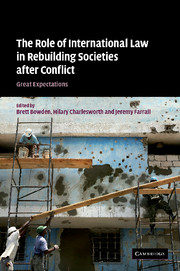Book contents
- Frontmatter
- Contents
- Contributors
- Preface
- Abbreviations
- Introduction
- 1 The ‘state-building enterprise’: Legal doctrine, progress narratives and managerial governance
- 2 Democratisation, state-building and politics as technology
- 3 International law, human rights and the transformative occupation of Iraq
- 4 Defining democracy in international institutions
- 5 Democracy and legitimation: Challenges in the reconstitution of political processes in Afghanistan
- 6 Impossible expectations? The UN Security Council's promotion of the rule of law after conflict
- 7 Legal pluralism and the challenge of building the rule of law in post-conflict states: A case study of Timor-Leste
- 8 From paper to practice: The role of treaty ratification post-conflict
- 9 Selective universality? Human-rights accountability of the UN in post-conflict operations
- 10 ‘Security starts with the law’: The role of international law in the protection of women's security post-conflict
- 11 Grappling in the Great Lakes: The challenges of international justice in Rwanda, the Democratic Republic of Congo and Uganda
- Conclusion: Hope and humility for weavers with international law
- Select Bibliography
- Index
10 - ‘Security starts with the law’: The role of international law in the protection of women's security post-conflict
Published online by Cambridge University Press: 31 August 2009
- Frontmatter
- Contents
- Contributors
- Preface
- Abbreviations
- Introduction
- 1 The ‘state-building enterprise’: Legal doctrine, progress narratives and managerial governance
- 2 Democratisation, state-building and politics as technology
- 3 International law, human rights and the transformative occupation of Iraq
- 4 Defining democracy in international institutions
- 5 Democracy and legitimation: Challenges in the reconstitution of political processes in Afghanistan
- 6 Impossible expectations? The UN Security Council's promotion of the rule of law after conflict
- 7 Legal pluralism and the challenge of building the rule of law in post-conflict states: A case study of Timor-Leste
- 8 From paper to practice: The role of treaty ratification post-conflict
- 9 Selective universality? Human-rights accountability of the UN in post-conflict operations
- 10 ‘Security starts with the law’: The role of international law in the protection of women's security post-conflict
- 11 Grappling in the Great Lakes: The challenges of international justice in Rwanda, the Democratic Republic of Congo and Uganda
- Conclusion: Hope and humility for weavers with international law
- Select Bibliography
- Index
Summary
Introduction
The concept of security is often simplified and misunderstood in post-conflict societies – those in which ‘predominately male combatants have ceased to engage in “official” war’. During post-war transition, women's victimhood has been emphasised at the expense of careful inquiry into women's unique experiences of conflict or their security needs during the peace-building process. Women's interactions with the notion of security are varied and complex, and extend far beyond a desire for an end to the ‘official’ war. This chapter explores two questions: what are the views of women regarding the role of law in protecting their security, and to what extent is law – both international and domestic – capable of transforming approaches to women's security? These questions respond to the demand, commonly expressed by women living through post-conflict transition, for a transformation rather than a mere reinterpretation of existing socio-political structures.
Meintjes, Pillay and Turshen describe transformation as distinct from reconstruction of the past. They interpret women's demands for transformation to mean the ‘substantive advancement’ of women, the permanent removal of ‘traditional gender restrictions’ and a recasting of social and political structures to enable gender equality in post-conflict societies. In the context of security, such a transformation requires the increased representation of women in peace-building roles. However, transformation also demands a new framework for security dialogue – the ongoing conversation between international, state and non-state actors engaged in the policy and practice of security in post-conflict societies.
- Type
- Chapter
- Information
- The Role of International Law in Rebuilding Societies after ConflictGreat Expectations, pp. 218 - 243Publisher: Cambridge University PressPrint publication year: 2009



